
Guinevere, also often written in Modern English as Guenevere or Guenever, was, according to Arthurian legend, an early-medieval queen of Great Britain and the wife of King Arthur. First mentioned in popular literature in the early 12th century, nearly 700 years after the purported times of Arthur, Guinevere has since been portrayed as everything from a fatally flawed, villainous and opportunistic traitor to a noble and virtuous lady. Many records of the legend also feature the variably recounted story of her abduction and rescue as a major part of the tale.

Uther Pendragon (Brittonic), also known as King Uther, was a legendary King of the Britons and father of King Arthur.

Mordred or Modred is a figure in the legend of King Arthur. The earliest known mention of a possibly historical Medraut is in the Welsh chronicle Annales Cambriae, wherein he and Arthur are ambiguously associated with the Battle of Camlann in a brief entry for the year 537. Medraut's figure seemed to have been regarded positively in the early Welsh tradition and may have been related to that of Arthur's son.
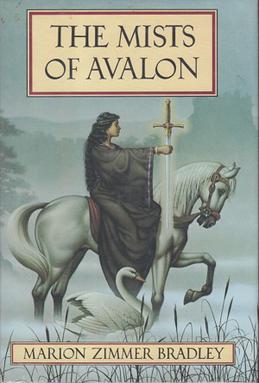
The Mists of Avalon is a 1983 historical fantasy novel by American writer Marion Zimmer Bradley, in which the author relates the Arthurian legends from the perspective of the female characters. The book follows the trajectory of Morgaine, a priestess fighting to save her Celtic religion in a country where Christianity threatens to destroy the pagan way of life. The epic is focused on the lives of Morgaine, Gwenhwyfar (Guinevere), Viviane, Morgause, Igraine and other women of the Arthurian legend.
The Queen of Orkney, today best known as Morgause and also known as Morgawse and other spellings and names, is a character in Arthurian legend in which she is the mother of Gawain and Mordred, both key players in the story of King Arthur and his downfall. In early texts, Mordred's father is her husband, King Lot of Orkney, with whom she may also have various other children. In later versions, including the seminal Le Morte d'Arthur, Mordred is the offspring of Arthur's accidental incest with Morgause, his estranged half-sister. There, she is furthermore a sister of Morgan le Fay, as well as the mother of Gareth, Agravain, and Gaheris, the last of whom murders her.
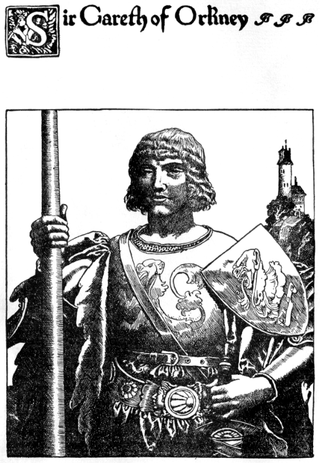
Gareth is a Knight of the Round Table in Arthurian legend. He is the youngest son of King Lot and Queen Morgause, King Arthur's half-sister, thus making him Arthur's nephew, as well as brother to Gawain, Agravain and Gaheris, and either a brother or half-brother of Mordred. Gareth is particularly notable in Le Morte d'Arthur, where one of its eight books is named after and largely dedicated to him, and in which he is also known by his nickname Beaumains.

King Lot, also spelled Loth or Lott, is a British monarch in Arthurian legend. He was introduced in Geoffrey of Monmouth's pseudohistorical Historia Regum Britanniae as King Arthur's brother-in-law, who serves as regent of Britain between the reigns of Uther Pendragon and Arthur. He has appeared regularly in works of chivalric romance, alternating between the roles of Arthur's enemy and ally, and is often depicted as the ruler of Lothian and either Norway or Orkney. His literary character is likely derived from hagiographical material concerning Saint Kentigern, which features Leudonus as king of Leudonia and father of Saint Teneu.
Constantine was a 6th-century king of Dumnonia in sub-Roman Britain, who was remembered in later British tradition as a legendary King of Britain. The only contemporary information about him comes from Gildas, who castigated him for various sins, including the murder of two "royal youths" inside a church. The historical Constantine is also known from the genealogies of the Dumnonian kings, and possibly inspired the tradition of Saint Constantine, a king-turned-monk venerated in Southwest Britain and elsewhere.
Maleagant is a villain from Arthurian legend. In a number of versions of a popular episode, Maleagant abducts King Arthur’s wife, Queen Guinevere, necessitating her rescue by Arthur and his knights. The earliest surviving version of this episode names the abductor Melwas; as Maleagant, he debuts as Lancelot's archenemy in Chrétien de Troyes' French romance Lancelot, the Knight of the Cart. However, all surviving versions seem to be later adaptations of a stock narrative of significantly earlier provenance.

Gaheris is a Knight of the Round Table in the chivalric romance tradition of Arthurian legend. A nephew of King Arthur, Gaheris is the third son of Arthur's sister or half-sister Morgause and her husband Lot, King of Orkney and Lothian. He is the younger brother of Gawain and Agravain, the older brother of Gareth, and half-brother of Mordred. His figure may have been originally derived from that of a brother of Gawain in the early Welsh tradition, and then later split into a separate character of another brother, today best known as Gareth. German poetry also described him as Gawain's cousin instead of brother.
This is a bibliography of works about King Arthur, his family, his friends or his enemies. This bibliography includes works that are notable or are by notable authors.

The Last Enchantment is a 1979 fantasy novel by Mary Stewart. It is the third in a quintet of novels covering the Arthurian legend, preceded by The Hollow Hills and succeeded by The Wicked Day.
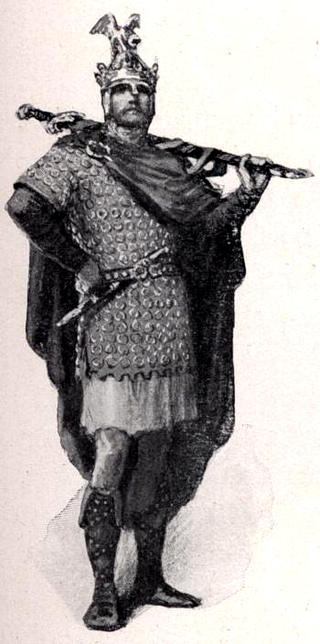
King Arthur's family grew throughout the centuries with King Arthur's legend. Many of the legendary members of this mythical king's family became leading characters of mythical tales in their own right.

Queen of the Summer Stars is a 1991 novel by Persia Woolley and is the second volume of the Guinevere trilogy that relate the Arthurian legend from the perspective of Guinevere. The novel introduces Lancelot and also outlines King Arthur's victory at the Battle of Badon Hill as well as his betrayal by his halfsister Morgan la Fay, the death of Merlin and the death of Morgause by her son Agravain Guinevere takes in and raises Mordred Morgause and Arthur's son after Mordred is revealed to Guinevere as King Arthur's son.
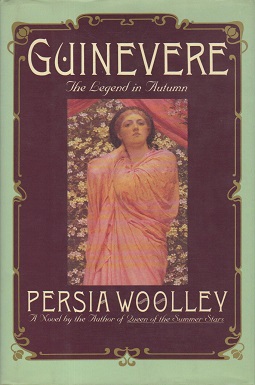
Guinevere: The Legend of Autumn is a 1993 novel by Persia Woolley. It is the third book of the Guinevere trilogy. The novel relates the events of the Arthurian legend in first-person perspective from the point of view of Guinevere, the wife of King Arthur. Beginning with Guinevere reflecting while imprisoned before being burnt at the stake for her affair with Lancelot, Guinevere retells the quest of the Holy Grail, the coming of Perceval and Gareth to the court and Mordred's rebellion with his brothers Agravain and Gaheris. The novel finishes with Arthur's war with Lancelot over Guinevere and the war between Arthur and his son Mordred ending in the death of Arthur and the end of an age.
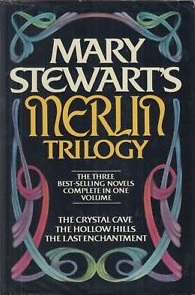
Mary Stewart's Merlin Trilogy is an omnibus edition of the first three novels in Mary Stewart's Arthurian Saga: The Crystal Cave (1970), The Hollow Hills (1973), and The Last Enchantment (1979). The omnibus was published in 1980 by William Morrow and Company. In 1983, Stewart published a fourth instalment in the series: The Wicked Day.

Arthur Rex: A Legendary Novel is a 1978 novel by American author Thomas Berger. Berger offers his own take on the legends of King Arthur, from the heroic monarch's inauspicious conception, to his childhood in bucolic Wales, his rise to the throne, his discovery of the great sword Excalibur, his establishment of the Knights of the Round Table, his long and honorable reign, and his heroic death in battle against the evil Mordred, his bastard son.

Mordred, Bastard Son is a 2006 Arthurian fantasy novel by Douglas Clegg. It tells the story of a sympathetic Mordred, including a romance with Lancelot. The novel was nominated for a 2007 Lambda Literary Award.

Daughter of Tintagel is a series of historical fantasy novels by British writer Fay Sampson. It tells the story of the life of Arthurian legend character Morgan le Fay, presented through an oral history narrative from her early childhood to her disappearance. It was originally published as five books between 1989 and 1992, followed by an omnibus edition in 1992. The series was re-published in 2005 as Morgan le Fay.















